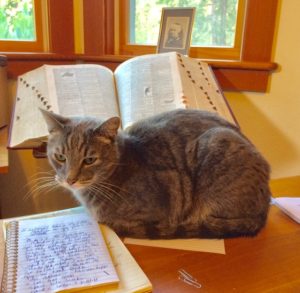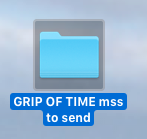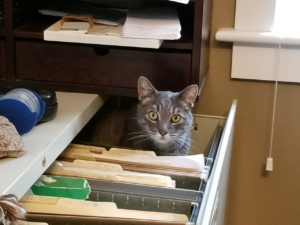Category — Writing
I believe
What do you do when something you believe in, something you really really believe in, something you need the support of others to make happen—oh, okay, a book project—gets a lukewarm response from the person it needs to get a white-hot, jumping-up-and-down response from—oh, okay, your agent? Who, to be honest, has never been seen jumping up and down, at least not about any of the five books of mine that he has found homes for.
Just a little more than a year ago, I wrote a blog about leaning into the yes in which I talked about a moment of “no” that caused me to reevaluate how I spent my time and with whom.
That moment also made me appreciate anew the people who have believed in me and helped me do the things I believe in.
Reading that post now, I am struck by how externally oriented it was, how it was about the environment(s) in which I existed or exist, and the impact others have had on what I’ve been able to do. It’s true: Some people pave the path for others. Some people throw boulders in the path. Staying away from the boulder-throwers and cleaving to the path-clearers makes for a better, happier, saner life.
But sometimes, like now, it’s not about others clearing or obstructing paths. It’s about me. It’s about me leaning into myself, me repeating “yes” to myself even as my agent sends me cautionary emails that describe boulder-strewn paths. I wish I could get a resounding “yes” from him. I wish I could get him to jump up and down. But what is more important, I am realizing, is fueling that momentum in myself. I am the one who needs to believe. Not just in the project but in myself.
I believe.
And not out of arrogance. Rather out of respect for the power of story, of this story I am compelled to write, to connect, to make a difference.
August 15, 2018 4 Comments
The Work
I wrote a book a while ago. It was about ballet. But what it was really about was what one has to sacrifice to be extraordinary, what one has to give up to excel. Because excellence comes at a price. The dancers whose world I immersed myself in gave up normal lives. They gave up (for the most part) relationships with anyone outside the dance company. The women, many of them, would give up having children. Childbearing years are peak dancing years. Most of the dancers would give up a pain-free, joint-healthy future. They so intensely, single-mindedly loved what they did that they made these sacrifices. Or they were so young still that they didn’t yet realize what they were sacrificing.
I’ve been thinking about what one might sacrifice to be an extraordinary writer. Or even just a pretty good one. It is not just a sacrifice of time. It’s a given that writing well takes all the time you have and then demands more. It is also a sacrifice of spontaneity. I don’t mean the spontaneity of prose. That is the heart and soul of the enterprise. That’s the juice. I mean the spontaneity of life. Because good writing (not to mention extraordinary writing) takes focus and discipline. It means applying the seat of the pants to seat of the chair. Staying indoors on a summer afternoon. Saying no when you wish you could say yes. Working after work. Taking your computer with you on vacation. Thinking story when maybe you should be, well, living life.
I’m remembering that Marge Piercy poem that begins: A real writer is one who really writes. And that’s it. That’s what it takes: really writing. And some days it feels like a sacrifice. And some days it feels like a great and glorious privilege. And some days you long for the time when you sold batik on the Embarcadero.
August 8, 2018 4 Comments
Click and send
Click and send.
That’s it.
The end to three years, actually more like four years, of intense, focused, rollercoaster work: A book.
Back in the old days, when I first started writing books, you printed out the entire manuscript and sent it in the mail to your editor. I loved watching the pages shoot out from the printer. I’d leave the room and come back, and the printer would still be going, working on my work. I loved straightening that stack of paper, aligning the edges, eyeing the height, feeling the heft. I rubberbanded it, placed it in the passenger’s seat and drove it down to the UPS store where the woman behind the counter knew me. “Another book?” she asked. And I would smile and nod.
And off it went. In a truck, in a plane, in another truck. A satisfying journey.
Still, the end was not and has never been a happy moment for me, despite the “Congratulations!” and “It must be so great to have it done!” and “You must be so excited” comments from others.
I’m not glad to finish. I am not excited about finishing. When I’m excited is when I’m writing, when I’m immersed a subject, hip-deep in the world of the book, all cylinders firing. I am thrilled to be so thoroughly absorbed. My life has a shape. My days have an order. There is focus to my reading, my thinking, my conversation, even my dreaming. I love the way writing demands tunnel vision, the way it obliterates the multi-tasker in me. The book is like a planet, and I am its moon. I love the tug of that gravitational pull. I never want to be released.
But then I am. At least, back in the old days, the end had a ritual to it, a moment captured and remembered in the weight of the manuscript in my hand. For a long time now, at least four books, I think, the end has been signaled only by click and send.
And so I click and send. And look for a new planet to circle.
June 6, 2018 4 Comments
I know why the caged bird sings
You know how sometimes you work really hard, I mean really hard, and you have the best of intentions, and you’re surrounded by people who are also working hard—and nothing happens?
This is not one of those times.
This is one of those times that commitment and passion and focus and hard work lead to something wonderful.
This is one of those times that good things happen to people for whom good things need to happen. One of those times that people who have been labeled as losers, who have been treated as losers, get to be winners. Because they worked for it. Because they deserve it.
And so I announce, with enormous pride, that two Oregon State Penitentiary men have won awards in the prestigious, national Pen America Prison Writing Contest: James Anderson placed first in the memoir category. Sterling Cunio placed second in the essay category.
To put this in perspective, Pen received more than 5,000 entries from prison writers all across the country.
To put this in perspective, neither James nor Sterling finished high school before they went to prison. James was 17, Sterling, 16 when they committed their crimes. To put this in perspective, Sterling turned 41 the day before he received the letter announcing the award.
Both these men, along with (give or take) 8 others, are part of a writers’ group I started for Lifers at OSP almost 3 years ago. Six men in the group began working on the Pen submissions more than a half a year before the due date.
I have never worked with writers hungrier for feedback, more eager to be edited, to revise and re-imagine, to work through multiple drafts without losing focus or energy. I have never worked with writers who had more important stories to tell.
Learning to tell your own story is powerful stuff. Particularly, especially, spectacularly for those whose only freedom is expression.
Pen will be publishing the winners at its site.
If you’d like to congratulate these winners, leave a comment and I will take it with me into the prison.
April 25, 2018 10 Comments
Writing your way to happiness
Can we write our way to happiness?
On first blush this question oozes self-indulgence and privilege. More woo-woo bullshit. An unwelcome resurrection of the Me Decade. (Forgive the reference, now impossibly quaint, as we suffer under the “leadership” of GNOTUS…Grand Narcissist of the United States.)
On second blush,“can we write our way to happiness?” could be the tagline for endless Writers’ Workshops in Tuscany.
But stay with me for a moment. There is a body of actual scientific research (remember what that is?) on the health and mood benefits of writing and rewriting one’s one narrative. (Google “expressive writing and health” for many citations.) Now there is research on story-crafting and behavior.
We all have a personal narrative that shapes our view of ourselves and the world(s) in which we live. We create that narrative. We construct stories out of experience, listen to others tell us about ourselves, learn (even if we don’t think we are, even if we don’t want to) what is expected, what is acceptable, and how we fit (do not fit) in. Over time, a grand narrative emerges. And we recite it to ourselves. Over and over. For some, this self-talk is debilitating.
What if we wrote it out this story. Looked at it. And then learned to tell another plausible tale, an alternative narrative, based on the same information.
That’s what researchers at Duke University did with a group of freshmen who (because of bad grades) told themselves they were losers, that they were unfit for college. That was their narrative. These students underwent a “story-changing intervention” (oh, I know, shades of 1984). But wait…in this intervention, they got information (and were exposed to inspirational videos) about students who struggled during freshman year but improved as they adjusted to college. The “loser freshman” story could then be recast into an upward trajectory, “this is just all part of growth and adjustment” story. And guess what? Students who had been prompted to change their personal stories improved their grades and were far less likely to drop out than the control group with no intervention.
I think about the notion of writing one’s way to a more positive self-image, a healing place, an invigorating place, a place of power and self-worth every time I sit with my writing group at Oregon State Penitentiary. They are all men serving life sentences for murder. Collectively, they have spent more than two centuries behind bars. There are eight of them. Do the math. To stay sane, to move beyond debilitating shame and endless guilt, they write about the lives they now live, the men they are learning to become, the men they have become. They are changing the narrative of their lives.
April 11, 2018 2 Comments
(Still) staying sane
The way we begin each session of the writers’ group I have been running at the Oregon State Penitentiary for going on three years is with a five-minute writing prompt. Every two weeks I come up with another prompt, generally a single word – trust, hope, friendship, power, dreams – that invites the guys to write about what they know and how they feel. Sometimes we do lists: 10 pieces of advice I’d offer to a new inmate; 10 things I’d do if I were prison superintendent for a day (an all-time favorite).
A while back I had them write a list of 10 things that keep them sane, that allow them to wake up every morning, morning after morning, year after year – some of them for more than 30 years – and keep on keeping on. The answers ranged from finding a sense of purpose to listening to music, from spiritual practice to indulging in Skittles. Faith. Will power. The knowledge that others have it worse. Books. Visitors. And, of course: WRITING.
I write along with them. They want me to, and I want to. This isn’t a class. It’s a group of people trying to make sense of the world and themselves through writing.
So I wrote my list, in full realization that it is infinitely easier to stay sane if you are me, healthy and free. Still, there is enough out here in the “free world” to make you run out into the streets screaming, to bring you to your knees sobbing. I offer my list below in hopes that you, dear reader, will write in with yours. We all need to expand our keeping-sane repertoire.
1. Writing. Always, since those first leatherette diaries with locks that didn’t lock, I have used writing to make sense of my world, to capture experience so I can learn from it, to try to understand others, to talk sense to myself.
2. Reading. Since I read my first chapter book (My Friend Flicka) and disappeared into someone else’s world, reading has been for me both an intense exploration of and immersion in the other and the most glorious of escapes.
3. My stubborn belief that most people are kind.
4. The clear-eyed compassion, kindness, toughness and perseverance I see in those who work to make a difference, and who serve as a model for my own behavior.
5. Lists. I make them. They bring order to chaos. They calm me.
6. Sweaty, full-on, challenging physical activity: long-distance biking, running, hiking, ballet, barre, holding two-minute planks, mini-triathlons. Without exercise, my mood plummets. I can be awash in negativity.
7. Simon, the cat. Sonny, the cat. Tenderberry, the cat. Sally, the cat. For cat-lovers, I need say no more. For others, you wouldn’t understand.
8. Solitude.
9. The heart-stopping physical beauty of the place I call home. Plus clouds, from every angle, especially looking down from 30,000 feet.
10.My family. I put them last in recognition of the fact that they are also sometimes the cause of my temporary insanity.
Now your turn.
April 4, 2018 6 Comments
Clearing the Decks
Ah the fine art of self-sabotage that some of us (cough, cough) are known to practice so diligently as to become masters. I myself am particularly adept at one excellent self-sabotaging strategy, the “I’ll just clear the decks” approach. (Explained, along with other excellent self-sabotaging behaviors, in The Write Path.)
Let’s say you have some important creative work to do. For example: A book. A book you care deeply about. A book that is the most challenging work you’ve ever done. It is hard. I mean: It is hard. The molding of it, the shaping of it, the finding a way through the experience, the writing into a place of knowing. It is so hard that one plots ways not to work as one simultaneously proclaims (to oneself) passion and commitment for the work. (And by “one” I mean me.)
Thus the “I’ll just clear the decks” approach.
I’ll get serious, I’ll buckle down, I’ll really start to work once I take care of all the little stuff that’s currently cluttering the “decks.” For example: Those 30 pounds of peaches we picked this weekend that need to be skinned, pitted, sliced and freezer-bagged. The peach-juicy counters that now need to be cleaned. Which makes the OTHER counters look bad by comparison, so, yeah, those. And the floor. Better put a load of laundry in. While I’m at it, I might as well strip the bed and change the bed linen. I need to make that appointment with the dental hygienist. And take a picture of those weird cucumbers I just went out into the garden to pick so I can post in instagram. And then look at what others have posted. And check my newsfeeds for the latest Trump catastrophe. Read the latest WaPo story. I’ll just scan the first few dozen comments. And now, gee, it’s 3 pm, and I can’t start in on serious work this late.
Thus concludes a successful day at self-sabotage.
(Sound of reveille) Good morning! Those decks I cleared yesterday so I could jump in and write today? Wouldn’t you know it, they’re cluttered again.
But right now, this very moment, as soon as I post this on my blog, I AM GOING TO WORK.
August 16, 2017 13 Comments
The stories we tell
I think about stories all t he time. Or, more accurately, I “think story” all the time. I think about the story the experience I am having will make, often in real time and especially if the experience is less than wonderful. “This will make a good story,” I might say to myself (I did say to myself) as an 18-wheeler spewed a tsunami of gritty road water in my face on the afternoon of the first day of a three-day bike trek. And, yes, I did write about it. “This will make a good story,” I might say to myself (I did say to myself) when, one morning not long ago, I stepped out the back door into a cool, lovely Oregon morning and skidded halfway across the porch when my bare foot encountered the splayed (still warm) guts of a vole the cat had proudly caught and eviscerated. And see, I just wrote about it.
he time. Or, more accurately, I “think story” all the time. I think about the story the experience I am having will make, often in real time and especially if the experience is less than wonderful. “This will make a good story,” I might say to myself (I did say to myself) as an 18-wheeler spewed a tsunami of gritty road water in my face on the afternoon of the first day of a three-day bike trek. And, yes, I did write about it. “This will make a good story,” I might say to myself (I did say to myself) when, one morning not long ago, I stepped out the back door into a cool, lovely Oregon morning and skidded halfway across the porch when my bare foot encountered the splayed (still warm) guts of a vole the cat had proudly caught and eviscerated. And see, I just wrote about it.
But I also think more deeply, more seriously about the stories we tell ourselves about ourselves and the stories others tell about us. I don’t mean made-up stories. I mean the narratives we construct to help give shape to our lives and make sense of our experience. I mean the stories others tell about us – again, not fabricated but constructed from their perceptions and the memories they retained – that tell us not so much about ourselves but about the people telling the stories.
I think about the men I work with at Oregon State Penitentiary, Lifers all, convicted murderers all, and the way they are learning to create narratives that are about something other than the worst thing they ever did, the lowest, most shameful moment in their lives. I think about the power of telling that story to yourself. And I think about a parole hearing I sat in on recently and the competing narratives I heard: One was the story of transformation, the 30 hard years of making sense of the senseless, of learning how to take responsibility, of figuring out how to live with the guilt, the anguish you caused so many people, of struggling to remake yourself into person who could never do what that person you were 30 years ago did. And then there was the other story, the one steeped in pain as raw today as it was three decades ago, a story of violence vividly remembered, of families shattered and lives forever altered, a story so often told, so often relived and remembered as to be truly indelible.
Both stories are true. But the story of pain, of the past, proved more compelling to the parole board.
And so the man who told the transformation story, a man who’s been in my writers’ group for almost two years, is now faced with another story to tell, a narrative that helps make sense of the parole board experience, a story that can help him process, understand and move forward from that experience. He’s working on it. I’m there to help.
That’s my story.
July 19, 2017 No Comments
Staying Sane
 The way we begin each session of the writers’ group I run at the Oregon State Penitentiary is with a five-minute writing prompt. Every two weeks I come up with another prompt, generally a single word – trust, hope, friendship, power – that invites the guys to write about what they know and how they feel. Sometimes we do lists: 10 pieces of advice I’d offer to a new inmate; 10 things I’d do if I were prison superintendent for a day (an all-time favorite).
The way we begin each session of the writers’ group I run at the Oregon State Penitentiary is with a five-minute writing prompt. Every two weeks I come up with another prompt, generally a single word – trust, hope, friendship, power – that invites the guys to write about what they know and how they feel. Sometimes we do lists: 10 pieces of advice I’d offer to a new inmate; 10 things I’d do if I were prison superintendent for a day (an all-time favorite).
Last week I had them write a list of 10 things that keep them sane, that allow them to wake up every morning, morning after morning, year after year – some of them for more than 30 years – and keep on keeping on. The answers ranged from finding a sense of purpose to listening to music, from spiritual practice to indulging in Skittles. Faith. Will power. The knowledge that others have it worse. Books. Visitors. And, of course: WRITING.
I write along with them. They want me to, and I want to. It is part of the writers group atmosphere I work hard to establish. This isn’t a class. It’s a group of people trying to make sense of the world and themselves through writing.
So I wrote my list, in full realization that it is infinitely easier to stay sane if you are me, healthy and free. Still, there is enough out here in the “free world” to make you run out into the streets screaming, to bring you to your knees sobbing. I offer my list below in hopes that you, dear reader, will write in with yours. We all need to expand our keeping-sane repertoire.
1. Writing. Always, since those first leatherette diaries with locks that didn’t lock, I have used writing to make sense of my world, to capture experience so I can learn from it, to try to understand others, to talk sense to myself.
2. Reading. Since I read my first chapter book (My Friend Flicka) and disappeared into someone else’s world, reading has been for me both an intense exploration of and immersion in the other and the most glorious of escapes.
3. Lists. I make them. They bring order to chaos. They calm me. I’ve written about them here.
4. Sweaty, full-on, challenging physical activity: long-distance biking, running, hiking, ballet, barre, holding two-minute planks, mini-triathlons. Without exercise, my mood plummets. I can be awash in negativity.
5. Simon, the cat. Sonny, the cat. Tenderberry, the cat. Sally, the cat. For cat-lovers, I need say no more. For others, you wouldn’t understand.
6. Solitude.
7. The heart-stopping physical beauty of the place I call home. Plus clouds, from every angle, especially looking down from 30,000 feet.
8. Sleep. Yes, it does knit up the raveled sleeve of care. I’ve written about it here.
9. My stubborn belief that most people are kind.
10.My family. I put them last in recognition of the fact that they are also sometimes the cause of my temporary insanity.
Now your turn.
May 31, 2017 8 Comments
Doing time
 For two hours every other Thursday we sit in an incongruously cavernous room around a rickety table drinking bad coffee out of Styrofoam cups and talking story. How to tell a story, why to tell a story, how writing is thinking, how writing lets you see what you ignore, remember what you forget, feel what you built a wall around feeling, how to craft a narrative of your own life so nobody but you can own it.
For two hours every other Thursday we sit in an incongruously cavernous room around a rickety table drinking bad coffee out of Styrofoam cups and talking story. How to tell a story, why to tell a story, how writing is thinking, how writing lets you see what you ignore, remember what you forget, feel what you built a wall around feeling, how to craft a narrative of your own life so nobody but you can own it.
The other people around the table, eight of them, are Lifers, men who have been sentenced to either Life with or Life without. The “with” and “without” refer to the possibility of parole. Possibility. One of the guys is entering year 34 of a Life with sentence. He’s been denied parole eight times so far. Three of the guys were sentenced to Life when they were 17, one without the possibility of parole. The oldest in the group will be 79 next month. The youngest is 37.
You get a Life sentence for doing something bad, generally very bad. Not “just” murder, but aggravated murder. When I started working with these guys, coming into the maximum security prison to lead a writers group, I stayed purposely ignorant of the details of their crimes. I wanted to see them for the men they were now not who they were when they did the worst thing they’d ever done. I asked them not to tell me their last names so I wouldn’t be tempted to look them up in the system.
For a time, that worked. Now, for various reasons mostly having to do with references in their writing and conversations around the rickety table every other Thursday, I know. I know sometimes more than I want to know.
And here’s something odd and in a way wonderful and for me transformational: It doesn’t matter. I see clearly what they did. I see the horror and cruelty and amorality of it. But I also know who they have become. I see how almost all of them have, over time, faced the guilt, the shame, the pain they caused and continue to cause, the lives they ruined that they can never make amends for, the history they forever changed. I see that, against all odds, some are blooming where they have been planted. I see that change is possible, that emotional, psychological, moral rehabilitation is possible. I see that the cracks have let the light in.
I am learning so much more than I am teaching.
February 8, 2017 9 Comments












